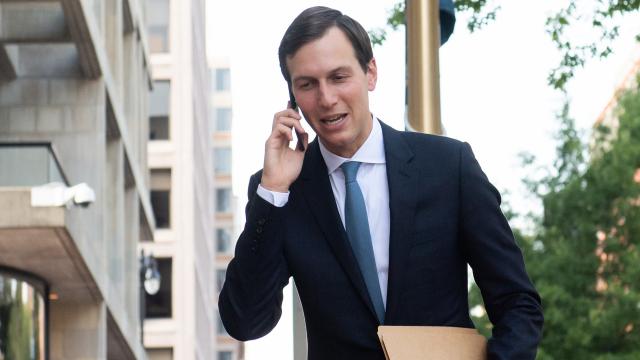Donald Trump’s re-election campaign and its de facto leader, his son-in-law and Jimmy Neutron wannabe Jared Kushner, is locked in an increasingly bitter feud with mobile networks preventing them from spamming millions of people with donation or get out the vote requests.
Per Business Insider, the campaign was blocked from sending a surge of text messages by third-party firm Zipwhip, which handles spam prevention for several major carriers, over the July 4 weekend. Kushner then escalated the matter by calling their bosses, getting on the phone with the CEOs of AT&T, Verizon, and T-Mobile to lodge complaints soon after.
Neither side in this fight are entities deserving of any sympathy. But if the Trump campaign is using an automated method to send the texts, something it denies, that could potentially violate both the Telephone Consumer Protection Act and Federal Communications Commission regulations. In what seems like a violation of voluntary telecom industry guidelines, many of the messages reportedly contain no option for recipients to unsubscribe from the president’s hellhole contact list and are being sent to people who never actually signed up in the first place. One seen by BI read:
Hi it’s Pres. Trump. I need your help ASAP to FIGHT BACK against the radical left & take back my majority. Take a stand NOW.
About a million of the texts went through, according to Politico, in what was supposed to be a test run before the general election begins. A similar dust-up in the crucial period immediately preceding election day, however, could sabotage a candidate’s campaign.
The telecom companies have reportedly been exasperating for the Trump campaign to work with and evasive on specifics. In statements to BI, the carriers cited standards set by the Cellular Telecommunications Industry Association, which isn’t a government regulator but an industry group that asks members to abide by certain guidelines. CTIA told BI its standards mandate “all senders — whether airlines, schools, banks, or campaigns — to include clear opt-out language and gain prior consent before sending a text” as part of “simple steps” to ensure text messaging isn’t totally overtaken by spam.
In other words, Trump’s campaign texting operation failed to clear carriers’ policies. Colour us shocked, or whatever.
According to Politico, “people familiar with the situation” say the campaign relies on peer-to-peer messaging, in which campaign volunteers and workers send texts manually using a contact sheet, rather than robotexting. Though the recipient likely neither knows nor cares why they’re getting a surprise text, the FCC considers it legal to send out text messages using P2P systems without first obtaining opt-in consent from the recipient because of the human intermediary. Yet Trump’s 2016 campaign was sued for unsolicited text messages in 2016, with the plaintiffs claiming they were robotexted without the required consent, and it went on to pay a $US200 ($281),000 ($280,660) settlement. (The campaign continued to deny it had used auto-dialers.) A lawsuit filed in April 2020 makes similar claims about the president’s re-election effort.
The telecoms may have been reacting to the prospect of fines. Earlier this year, the FCC slapped top carriers including AT&T, Sprint, and T-Mobile with over $US200 ($281) million in related fines (despite the best efforts of its Trump-appointed chairman Ajit Pai to $US10,000 ($14,033) per instance for illegal calls late last year.
According to BI, an industry lawyer said that as the FCC’s authority to levy fines allows them to level arbitrary ones, they could potentially run into the billions. On the other hand, the FCC is known for barely lifting its finger on enforcement, especially with regard to debt collection, and it probably doesn’t want to be seen as interfering in the election.
Trump’s operation is relying heavily on text messages to mobilize supporters to donate, volunteer, and get to the polls on election day during the coronavirus pandemic. So too has presumptive Democratic nominee Joe Biden, as the coronavirus pandemic has significantly disrupted many regular elements of voter outreach like canvassing or rallies. Trump, however, has a much more robust digital operation and is notably more aggressive in both the tone and quantity of texts it’s been sending out.
According to Politico, Kushner, who has a robust track record of royally screwing up sensitive negotiations, took five days to sort the matter out with the telecoms — while a source told BI the matter wasn’t fully resolved as late as last week. This reportedly another round of suspicion within the Trump campaign that it was yet more evidence of the supposedly all-encompassing conspiracy in the tech world to throw him out of office.
In reality, campaigns of other persuasions including Senator Bernie Sanders’ have faced lawsuits over alleged violations of consent requirements. Democrats and non-profits have also criticised the FCC’s 2018 reclassification of text messaging as an information rather than telecommunications service and thus regulated much more loosely. Pai has insisted deregulation will give carriers the flexibility to tackle the robotext problem, though Democratic FCC commissioner Jessica Rosenworcel and nonprofits like Public Knowledge have argued it gives carriers the ability to censor political speech or extort senders for payments.
